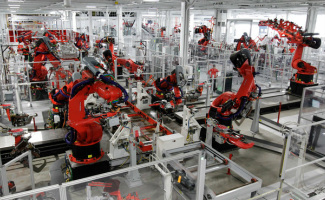 A factory run by robots in Fremont, CA. Tags: capitalism, economic sociology, globalization, marx/marxism, organizations/occupations/work, science/technology, theory, assembly line, deskilling, jobs, labor, reskilling, robotics, 00 to 05 mins Length: 3:58 Year: 2012 Access: New York Times Summary: This NYT video examines innovations in robot technology used for factory production (see associated article). These robots are far more sophisticated than typical factory robots, and they have important implications for work, labor, and the geography of the global economy. As Marx predicted, global competition drives producers to mechanize their operations to drive down costs. For example, as the article notes, "In one example, a robotic manufacturing system initially cost $250,000 and replaced two machine operators, each earning $50,000 a year. Over the 15-year life of the system, the machines yielded $3.5 million in labor and productivity savings." The robots are replacing huge numbers of low and mid-skilled workers, making assembly lines more efficient and creating some higher skilled jobs. At 2:50, a representative from a robotics company states "We don't view robots as a way to eliminate the labor, it's just an opportunity to raise that skill set and help everybody realize a better life as a result of that, get them out of that repetition and into a place where they can earn a higher wage and be more successful." Viewers may reflect on this highly optimistic view. In some cases, these advanced technologies are bringing manufacturing jobs now held in countries like China back into the US. With the automation of much manual labor, the new jobs are often safer - but they also have new forms of stress and higher insecurity. However, many people who lose their jobs do not have access to the education and training needed to reskill themselves for the new jobs. Furthermore, such technologies might lead to the increasing polarization of jobs in terms of both skills and wages. Who wins and who loses when robots replace human labor? Image by Paul Sakuma/Associated Press Submitted By: Paul Dean
4 Comments
michael miller
8/27/2012 02:14:26 am
Great post, Paul! I'll be sure to use in work & occupations class.
Reply
Due of security concerns, the trend is toward a cashless society... Crypto seems like a more secure way to guard your valuables against theft or governmental collapse. All agree, nevertheless, that there is no evidence to support it.
Reply
Manuel Franco
7/30/2023 11:50:39 am
I just want to say Thank You to everyone who supported me through the years. My name is Manuel Franco, New Berlin, Wisconsin. My story of how I won the Powerball lottery of $768.4M is a bit of a tale. I have been playing Powerball tickets for 6 years now since I turned 18. I bought my first ticket on my 18 birthday. I was feeling very lucky that day because I had contacted Dr. Odunga Michael to help me with the winning Powerball numbers. I really had that great great feeling that I looked at the camera wanting to wink at it. I only did a tiny part of it and trusted him. He gave me the numbers after I played a couple other tickets along with it for $10. I checked my ticket after the winnings came online and saw the numbers were correct including the Power play. I screamed for about 10 minutes because it felt like a dream. I had won $768.4M. You can check my winning testimony with the lottery officials just with my name search. Thank you Dr Odunga. Well, his email is [email protected] and you can also call or Whats-app him at +2348167159012 so you guys can contact him
Reply
mark hold
7/8/2024 07:41:11 am
Herbal Penis Enlargement product is 100% guaranteed to Enlarge and get a better ERECTION, the reason why most people are finding it difficult to enlarge Penis is that they believe in medical reports, drugs and medical treatment which is not helpful for Penis Enlargement. Natural roots/herbs are the best remedies which can easily Enlarge your Penis permanently Contact Dr MOSES BUBA via Email: [email protected] or via WhatsApp: +2349060529305. for Natural root and herbal remedies put together to help Enlarge manhood and Erect healthily. I also learn that Dr MOSES BUBA also can cure other types of diseases, HEPATITIS B,DIABETICS,CANCER,HPV,LOW SPERM CAM, HIV/STDS, FIBROSIS LOST OF WEIGHT, BREAST ENLARGEMENT, HIPS and BUMS ENLARGEMENT etc .
Reply
Leave a Reply. |
Tags
All
.
Got any videos?
Are you finding useful videos for your classes? Do you have good videos you use in your own classes? Please consider submitting your videos here and helping us build our database!
|
 RSS Feed
RSS Feed
